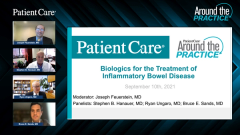
Selecting a Biologic Therapy for IBD
Factors that impact which biologic therapy a gastrointestinal specialist may initiate for a patient with inflammatory bowel disease, especially during the COVID-19 pandemic.
Episodes in this series

Joseph Feuerstein, MD: I’d like to continue with our case presentation. Our patient undergoes an MR [magnetic resonance] enterography, which shows 80 cm of disease involving the small bowel and some areas of narrowing, suggesting stricturing disease, but no upstream dilation. We’d like to poll the audience with the following questions. Which of the following would you rank most important when considering drug therapy? Efficacy, safety, mode of delivery, or cost? Would you start prednisone on this patient? A) yes; B) no; or C) wait for gastroenterology to advise?
Dr Ungaro, when thinking about starting treatment in a patient like this, and especially because this patient probably needs to start biologic therapy, as we’ve discussed already, in the era of COVID-19 and the risks associated with it, how do you approach COVID-19 and the risks overall for this patient?
Ryan Ungaro, MD: Obviously, at the start of the pandemic, there were a lot of concerns about our biologic agents and targeted agents. Were they going to put our patients at increased risk for adverse events due to COVID-19? What we’ve learned is that the vast majority of the medications that we use, particularly the targeted biologic agents, appear to be low risk for patients in terms of COVID-19, meaning if they were to get COVID-19, are they more likely to be hospitalized or have an adverse outcome. When you’re looking at biologic monotherapy—the anti-TNF [tumor necrosis factor] drugs, anti–IL-12/23s, and anti-integrins—these appear to be low-risk agents and potentially even slightly protected, but I take that with a grain of salt, with this all being observational data.
In general, we have accumulated data that we should approach treatment similar to as we would pre-pandemic, with the exception of a couple of treatment strategies that we’re already trying to think of how to limit. One would be corticosteroids, as Dr Hanauer already mentioned. That’s the one drug that has consistently been associated with adverse outcomes in COVID-19. Thinking about this patient, she may need steroids, at least temporarily, so thinking about what’s going to get her off of steroids fastest in the era of COVID-19 may have a little extra import.
And then sometimes when we do combination therapies, we’re combining thiopurine agents, like azathioprine, 6-MP [mercaptopurine], plus anti-TNF agents. Those patients may be at slightly increased risk of adverse events. That’s one other consideration. Ultimately, what we’re recommending to all our patients with IBD [inflammatory bowel disease] is that they get vaccinated against COVID-19. Since it’s not a live vaccine, whether they’re on therapy or not, they should be getting their vaccination. Overall, I’d say our treatment approach is not too different, except reemphasizing the need for steroid-sparing approaches and de-escalation if you have a patient on multiple immunosuppressive agents.
Joseph Feuerstein, MD: Thank you. Dr Sands, when thinking about starting a patient on a biologic agent, how do you factor overall drug efficacy, safety, mode of delivery, and cost?
Bruce E. Sands, MD: The answer to that question will really depend on the presentation of the patient. If we want to focus on this particular patient, she has a lot of risk. She has 80 cm of disease in the bowel. It’s a pretty long segment. She already has evidence that she’s progressing toward stricturing disease. So the thing that weighs the most here is the efficacy. Of course, we want safety as well. The patient has to be able to afford the medication, but convenience is probably a lower item on the list because we absolutely need to get this patient under control pretty quickly.
Transcript edited for clarity.
Newsletter
Enhance your clinical practice with the Patient Care newsletter, offering the latest evidence-based guidelines, diagnostic insights, and treatment strategies for primary care physicians.
































































































































